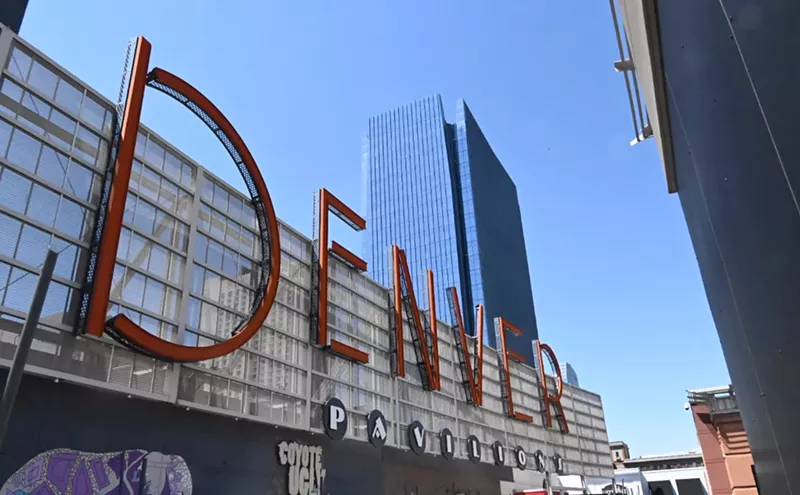The silent treatment is inadvisable for anyone in the newspaper game. After all, journalists who regularly demand disclosure from public officials and other newsmakers can't claim the moral high ground if they clam up the instant uncomfortable inquiries are aimed their way. But it's especially astonishing at the Daily, which has a lengthy history of battling for free speech.
Then again, the paper's past might explain Miller's reticence to discuss the deal, the details of which have not yet been disclosed. Not only was the Daily once the most liberal paper in Colorado's best-known sanctuary for progressive thought, but it loudly trumpeted its independence and regularly took on the right-wing power structure. Now, however, it's the property of Scripps, among the nation's most conservative media outfits. "It's ironic," notes Clint Talbott, who edited the Daily for a dozen years before becoming a Camera columnist. "A once-radical enterprise has become part of a corporate empire that it would have long railed against."
Obviously, the times they have a-changed -- but according to Todd Moore, who served the Daily as a writer and graphics whiz in the mid-'80s, the main shifts took place long ago. "The beauty of the Daily back then is that the inmates ran the asylum," he maintains. "It was a vibrant, funny paper, and you never knew what you were going to find. Now it's just filler around the pizza ads."
That conclusion's a bit harsh: Today's Daily does a consistently solid job of covering its community and offers decent arts coverage. Nonetheless, Moore's mention of advertising is apropos. Under Miller, who previously worked in various capacities for the Kansas City Star and the Denver Post, the Daily has become a successful mainstream business that the Camera couldn't undermine. Mark Contreras, Scripps vice president for newspaper operations who'll oversee the Daily, isn't any more loquacious than Miller; his only comment is a canned quote also provided to other outlets, in which he calls the Camera and the Daily "unique" and says "each will continue to be a vital news and information source." But there's no doubt Scripps decided that if you can't beat 'em, buy 'em.
The Daily began life in September 1892 as the Silver and Gold, the University of Colorado at Boulder's campus newspaper; the current name came along in 1953, when staffers decided the previous moniker made it sound like a mining journal. (CU now has an internal newspaper called the Silver and Gold Record.) For more than a half-century, the paper was studiously non-controversial -- but that changed in the '60s, when the Daily's fervent opposition to the Vietnam War eventually inspired CU regents to sever ties with the paper. In 1971, under the leadership of Timothy Lange, the Daily re-established itself as a not-for-profit organization, mutating into an employee-owned concern just over a decade later.
Editorially, meanwhile, the paper tackled Republicanism head on -- literally. An issue-length 1984 attack on then-president Ronald Reagan sported incendiary essays by the likes of Amiri Baraka and a photo illustration of a football placekicker lined up to boot Reagan's noggin. Scripps, in contrast, loved Reagan and his ideological brethren; the company has endorsed Republicans in every presidential election but one since the '30s, and forced its papers to do likewise until last year, when the Camera rebelled. (Had this policy not ended, the Daily could be in the position of printing a rave about someone like Bill Frist three years from now.)
Upon Lange's 1986 departure and Talbott's entry as editor, the Daily began focusing less on incendiary rhetoric and more on local journalism. Still, its editorials tilted leftward and regularly attacked the Camera as "Brand X paper -- the big corporate behemoth that was, in our view, bland and shipping off local profits," Talbott recalls. (When he joined the Camera in 1998, Talbott says, he was disabused of his biases.) Unfortunately, the Daily's own bottom line soon became a bigger issue, after finance director Mark Breese was found to have embezzled at least $250,000.
The paper was on the brink of collapse when Miller purchased it four years ago, but he quickly shored up its business side and aggressively moved forward with expansion plans. The Camera countered in 2004 by creating dirt, a free daily paper targeting the youthful constituency that the Daily aims to attract. Scripps's purchase of the Daily would seem to make dirt expendable, and while Greg Anderson, the Camera's publisher, praises the spinoff's performance to date, he stops short of guaranteeing its survival. "We'll be getting together with the leadership of dirt to discuss that," he allows. "We haven't discussed any of it yet." Neither have decisions been made about offering advertisers the opportunity to jointly buy ads in the Camera and the Daily, Anderson says, "but there are definitely some synergies there."
Both Anderson and Talbott assert that Camera employees were buoyed by the Daily buy, because it proved that Scripps is committed to the Boulder market. As for folks at the Daily, they're not talking on orders from Miller, whose zipped lips invite speculation about his plans. The paper's "independent, critically minded spirit of reporting and editorializing aren't going anywhere," he said in the Daily's piece about the transaction, and he's supposed to remain in his current posts, too. If Miller's going to stick around, though, he has a responsibility to readers to explain and defend his compact with Scripps. If, on the other hand, he intends to lie low until everything's finalized and then cash out, why bother?
Either way, it probably won't matter. Leland Rucker, who edited the Daily's entertainment section for seven years beginning in 1986, says, "I don't think there'll be a lot of change," and Moore concurs. He predicts that "the only difference will be they can now jack up their advertising rates all the way around the horn."
Factor facts: Rocky Mountain News media writer Dusty Saunder's September 26 column certainly made the paper's web department happy. The piece, about KHOW's plans to yank Bill O'Reilly's Radio Factor from its lineup in favor of syndicated yakker Glenn Beck, generated an estimated 190,000 hits at the Rocky's address after it was posted on Matt Drudge's DrudgeReport.com. Yet the behind-the-scenes action is more interesting than the details that saw print.
KHOW's first announcement of the Beck-for-O'Reilly swap was sent to journalists on September 15 and included a firm date for Beck's Denver bow: September 19. But on September 16, KHOW promotions director Jan Whitbeck sent out a second note that said the debut had been delayed "due to contractual issues."
Jerry Bell, KHOW's program director, says O'Reilly's syndicator, Westwood One, disputed the station's interpretation of its Radio Factor contract. "We thought we could run his spots but didn't necessarily have to run his show, but there was disagreement over that," Bell reveals. So KHOW has delayed Beck's first appearance in order to give Westwood One the chance to sell the Factor to another signal. "Someday, Westwood One may have a show I want, and I didn't want to piss them off," Bell explains. "And if they can place Bill's show, that takes heat off me, because people who like it can find it there."
Trouble is, there's no logical spot for O'Reilly in Denver, since his KHOW ratings trailed those of KOA's Rush Limbaugh and KNUS's Sean Hannity, not to mention AM 760's Ed Schultz. Right now, Westwood One is playing for time by spinning on behalf of O'Reilly's "no-spin zone"; in an e-mail, spokesman Peter Sessa insists, "They have not Œdropped' the Radio Factor, they are in negotiations." And although Bell says KHOW can't wait indefinitely for Westwood One to find O'Reilly a home, the Beck unveiling remains on hold.
Sorry, Mr. Drudge: The Bill is still pending.












